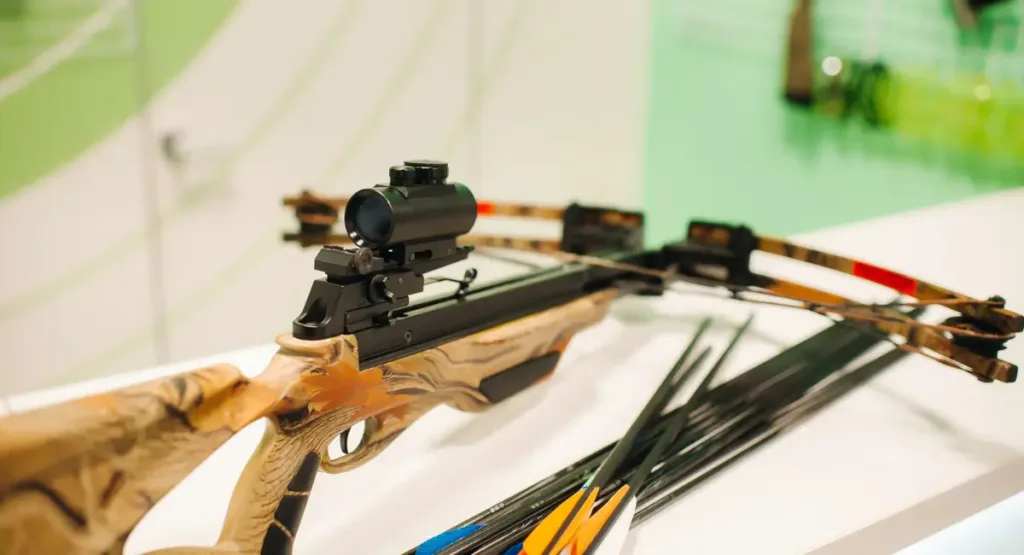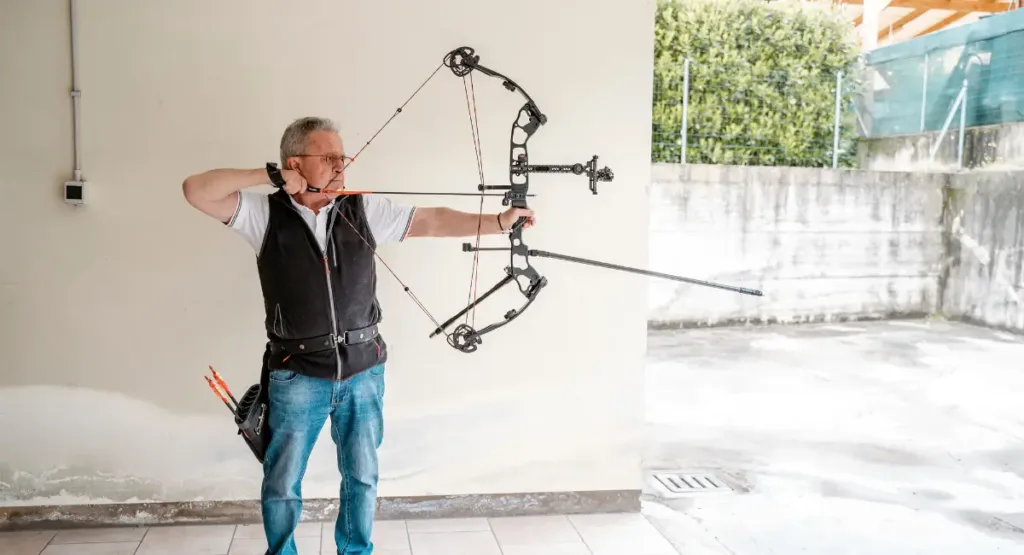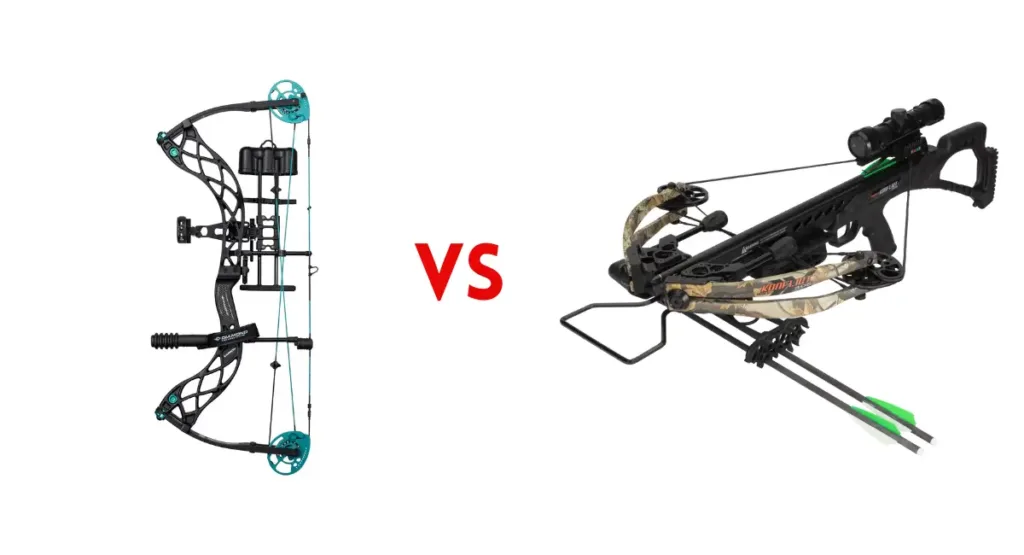Compound bow Vs crossbow have always been a hot topic of debate when choosing the right bow for your archery or hunting adventures, regardless of whether you are a beginner or an experienced archer. Aside from each type’s distinct advantages, some styles and preferences can be accommodated.
This guide intends to take a deeper look into each option’s characteristics, advantages, and disadvantages to help you make a more informed decision.
Understanding the Crossbow Appeal
There are several reasons why crossbows have gained popularity in recent years, especially among beginners and those with physical limitations. They are characterized by their simplicity, which is a great advantage. A crossbow, on the other hand, does not require the archer to be able to draw and hold the string, as is the case with traditional bows. This technique can be especially beneficial for individuals who lack upper body strength or have disabilities.

Critical Advantages of crossbows:
- Ease of Learning: Crossbows are known for their straightforward learning curve, making them an excellent choice for archery beginners.
- Ready to Fire: They remain cocked and prepared to shoot, which can be crucial in time-sensitive hunting situations.
- Compact Design: Their compact nature allows for maneuverability in dense forests or tight spaces.
- High Kinetic Energy: Crossbows generate more kinetic energy than traditional bows, allowing deeper penetration of targets.
- Suitability for Disabled Archers: They offer an inclusive option for archers with physical challenges.
Limitations of crossbows:
Despite their advantages, crossbows have certain drawbacks.
- Higher draw weights typically require increased physical strength to pull, which might be challenging for some users.
- Loading Time: They are generally slower to reload than compound bows.
- Bulkiness: Despite compactness, they are often heavier and bulkier than their counterparts.
- Noise: The release mechanism can be loud, potentially alerting prey.
Discover the Compound Bow Charm
Compound bows, on the other hand, are trendy in hunting since they are stealthy and easy to handle. In particular, they are renowned for their accuracy in rapid consecutive shots, which makes them ideal for hunters who may have to shoot several times in a short amount of time.

Advantages of compound bows:
- No Need for Cooking: They eliminate the need for cooking devices, streamlining preparation.
- “Let Off” Feature: This unique characteristic reduces the draw weight as the bow is drawn back, making it easier to hold for extended periods.
- Stealthy Operation: Compound bows are quiet, providing a tactical advantage in a surprising game.
- Speed of Reload: They allow for quicker reloading, which can be critical in dynamic hunting scenarios.
- Lightweight Design: Their light frame makes them comfortable to carry during long hunts.
Drawbacks of compound bows:
Compound bows have their challenges.
- Physical Demand: Drawing a compound bow requires significant strength despite the “let off” feature.
- Learning Curve: They need practice to master, especially for novices unfamiliar with the mechanics.
- Size: While generally compact, their length can be cumbersome in dense brush.
Making the Right Choice: Compound Bow vs Crossbow
Choosing the right bow (compound bow vs crossbow) is a matter of considering your physical abilities, your hunting environment, and the types of bows you have used. If you are most interested in ease of use and minimal physical strain, you might be better off with a crossbow. Nevertheless, if you are more interested in stealth, speed, and the joy of mastering a skill, a compound bow could be a good choice if you are looking for a satisfying experience.
It should be noted that, in the end, both options have their place in the arsenal of an archer. When you weigh the pros and cons and align them with your personal needs and preferences, you can choose the bow that will provide you with the most rewarding experience. It is up to you to decide whether you will opt for the straightforward efficiency of a crossbow or the refined challenge of a compound bow that will define your path in the captivating world of archery and hunting.
frequently Asked Questions (FAQs)
Is the compound bow vs crossbow more manageable for beginners?
The crossbow’s straightforward shooting mechanism makes it a good choice for beginners. Those new to archery will find them more accessible because they don’t require the strength and technique of compound bows.
How far can I shoot with a crossbow?
Crossbows are capable of long-range shots but are generally more effective at medium ranges than longbows or compound bows. Despite their accuracy, maximum effective ranges vary depending on the model and the user’s skill level.
Which is better for hunting, compound bow vs crossbow?
Both are effective for hunting but serve different purposes. Hunters who need to shoot more than once will benefit from compound bows due to their quietness and ability to quickly follow up shots. Unlike bows, crossbows are easier to use and are better suited for hunters who need a ready-fire solution without the physical demands of drawing a bow.
What is the cost of maintaining a compound bow vs crossbow?
Both bows require maintenance, but compound bows may incur higher costs over time because of their complexity and regular tuning. Generally, crossbows require fewer components that need periodic adjustment, but their mechanical parts and strings need regular maintenance.
Can children and teenagers use compound bow vs crossbow?
Yes, young archers can use both, but their strength and height must be considered when choosing the size and weight of the bow. Due to their inherent power and potential for misuse, crossbows require supervision and proper safety training.
What is the weight difference between compound bow vs crossbow?
The weight of a compound bow is generally less than that of a crossbow, making it easier to carry for extended periods, such as when hunting. Crossbows tend to be heavier and bulkier, which may be better for hunters who move around or hunt from a distance.
Is a crossbow hunting permit required?
Different laws are depending on where you live. All hunters can hunt with a crossbow during the regular archery season in some areas. Some hunting seasons are restricted, or special permits are required, especially for hunters with disabilities. Crossbow hunters should always check local regulations before hunting.
When will I become proficient at using a compound bow?
There is a significant variation in the time it takes for individuals to become proficient. A regular practice schedule is essential, and while some may see significant improvement within a few weeks, others may take several months to feel comfortable and accurate. Compound bow shooting requires consistency and proper training.
Is it possible to compete with a crossbow in archery?
Crossbows are indeed used in competitive archery. There is, however, often a separation between crossbow users and traditional and compound bow archers in competitions because of differences in equipment and shooting techniques.
What types of arrows are available for crossbow vs compound bow?
There are different designs of arrows (also called bolts for crossbows) for different bow types. It is common for crossbow bolts to be shorter than compound bow arrows and to be designed so that they can withstand crossbow kinetic energy. Choose the right arrow type for your equipment to ensure safety and maximize performance.
Recent Posts
- Best Compound Bow for Beginners: Choosing The Right Arrow Vanes for A Compound Bow
- Conquering the Budget Realm: Unveiling the Best Crossbows Under 500 (7 Options)
- Mastering the Art: Choosing the Best Recurve Bow for Beginners
- Best Compound Bow for Women – Is There a Difference?
- Mastering the Art: Top 8 Best Recurve Bow for Beginners and Women
- Best Compound Bow for Women in 2024







